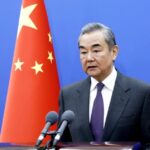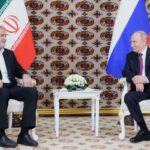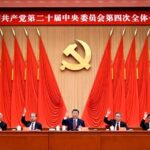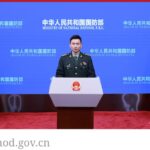As agreed between China and the EU, President of the European Council Antonio Costa and President of the European Commission Ursula von der Leyen will visit China on July 24. President Xi Jinping will meet with them. Premier of the State Council Li Qiang and the two EU leaders will jointly chair the 25th China-EU Summit, the Chinese Foreign Ministry announced on Monday.
Commenting on the upcoming 25th China-EU Summit, Chinese Foreign Ministry spokesperson Guo Jiakun said on Monday that as two major forces in building a multipolar world, two big markets that support globalization, and two great civilizations that advocate cultural diversity, the upcoming China-EU Summit is of great significance and receives international attention.
This year marks the 50th anniversary of the establishment of China-EU diplomatic ties as well as the 80th anniversary of the founding of the UN. As changes unseen in a century are accelerating in a turbulent world, and unilateralism and bullying practices have dealt a heavy blow to international order and rules, humanity once again stands at a critical juncture, the spokesperson said.
“This summit is an opportunity to engage with China at the highest level and have frank, constructive discussions on issues that matter to both of us. We want dialogue, real engagement and concrete progress. We aim for a fair, balanced relationship that delivers for both sides,” Costa said in an official post on the European Council’s website.
Observers noted that differences have emerged between the two sides on various issues, including the EU’s imposition of anti-subsidy tariffs on Chinese electric vehicles and restrictions on the participation of Chinese companies in public procurement of medical equipment. Chinese side also took necessary moves to safeguard its legitimate rights and interests.
The EU adopted on July 18 its 18th package of sanctions against Russia, blacklisting 26 new entities for circumventing sanctions, including seven in Chinese mainland, and three in Hong Kong, Reuters reported.
When asked about the EU’s latest round of sanctions against Russia, the Chinese Foreign Ministry spokesperson Guo Jiakun said on Monday that China opposes any unilateral sanctions that have no basis in international law or the authorization of the UN Security Council. The normal exchange and cooperation between Chinese and Russian companies should not be disturbed or affected.
On the Ukraine crisis, China has been committed to promoting peace talks. We never provide lethal weapons to any party to the conflict, and strictly control the exports of dual-use items, Guo said.
“We urge the EU to stop harming the lawful interests of Chinese companies without any factual basis. China will do what is necessary to firmly safeguard the legitimate and lawful rights and interests of Chinese companies,” the spokesperson said.
The current China-EU relationship urgently needs a comprehensive and objective review of its development over the past 50 years, Cui Hongjian, director and professor of the Center for European Union and Regional Development Studies at Beijing Foreign Studies University, told the Global Times on Monday.
“At this historical juncture, both sides should reach a consensus on which experiences are worth learning from and which lessons need reflection. Significant differences in understanding this shared history still exist, and such divergences could impact mutual trust and future cooperation,” Cui said.
On practical issues, both sides must reaffirm the importance of economic and trade cooperation. While strengthening collaboration, it is also essential to properly manage and address differences, the expert said.
Critical juncture
In his meeting with von der Leyen in early July in Brussels, Chinese Foreign Minister Wang Yi described the upcoming China-EU leaders’ meeting as a significant event taking place at a critical juncture.
Wang said China looks forward to working with the EU to summarize the valuable experience and important insights from the past 50 years of the China-EU relations, and map out the future direction of dialogue and cooperation for the next 50 years, sending a clear, positive, and constructive signal to the world.
“One key point in current China-EU relations is the need for realistic expectations. Both sides are navigating multiple challenges – most notably, the disruptive impact of the US. This has forced China and the EU to devote considerable energy to managing those shifts,” Cui said.
However, the EU appears to be increasingly viewing its China policy through the lens of its US strategy, sacrificing parts of China-EU cooperation to align with US positions, the expert continued.
“Against such a backdrop, we must assess China-EU ties with calm and realism,” Cui added.
Strong economic ties
The economic and trade relationship between China and the EU is marked by strong complementarity, Zhao Junjie, senior research fellow at the Institute of European Studies at the Chinese Academy of Social Sciences, told the Global Times on Monday.
Zhao said that over the years, even during periods of cooling political ties, bilateral trade and investment have always remained active and strong, demonstrating the resilience and momentum of cooperation in this area.
Bilateral cooperation has borne fruitful results, which gives a boost to each other’s development and progress, delivers tangibly for nearly two billion Chinese and EU people, greatly contributes to world peace and development, and sets an example of mutually beneficial cooperation in the era of economic globalization,, the foreign ministry spokesperson said.
Our annual trade volume has jumped from $2.4 billion to $785.8 billion. Two-way investment stock has grown from nearly zero to $260 billion, according to Guo.
At present, two key sectors – green economy and digitalization – stand out as being particularly promising for deeper collaboration, some experts said.
Zhao said that the EU leads in technologies such as carbon capture and storage, while China has made significant progress in renewable energy, including wind, hydro, solar power, and new energy vehicles. “With strengths in both scale and technology, the two sides have great potential for collaboration in areas such as environmental protection and renewable energy under the broader green economy framework,” he said.
Moreover, in the digital economy, China holds clear advantages in 5G, the Internet of Things, blockchain, e-commerce, and digital payment systems, with mature technologies and widespread applications, while in contrast, the EU faces certain gaps in this field. Zhao said that advancing trade facilitation, lowering transaction costs, and improving efficiency through digital tools are shared goals and practical areas for cooperation.
Overall, this summit should be seen more as an opportunity for strategic communication, rather than merely a “performance review” focused on concrete deliverables, Cui said, noting that stabilizing China-EU relations, enhancing mutual trust, and managing differences are the goals with greater long-term value.
“As long as both sides are able to communicate on some fundamental issues and reach a degree of strategic consensus, it would already represent meaningful progress,” he said.
GT













